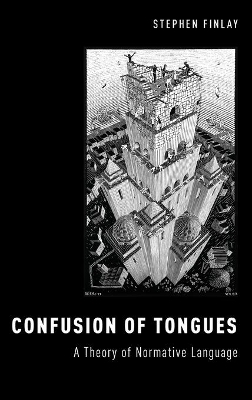
Confusion of Tongues
A Theory of Normative Language
Seiten
2014
Oxford University Press Inc (Verlag)
978-0-19-934749-0 (ISBN)
Oxford University Press Inc (Verlag)
978-0-19-934749-0 (ISBN)
Can normative words like "good," "ought," and "reason" be defined in non-normative terms? Stephen Finlay argues that they can, advancing a new theory of the meaning of this language and providing pragmatic explanations of the specially problematic features of its moral and deliberative uses which comprise the puzzles of metaethics.
Can normative words like "good," "ought," and "reason" be defined in entirely non-normative terms? Confusion of Tongues argues that they can, advancing a new End-Relational theory of the meaning of this language as providing the best explanation of the many different ways it is ordinarily used. Philosophers widely maintain that analyzing normative language as describing facts about relations cannot account for special features of particularly moral and deliberative uses of normative language, but Stephen Finlay argues that the End-Relational theory systematically explains these on the basis of a single fundamental principle of conversational pragmatics. These challenges comprise the central problems of metaethics, including the connection between normative judgment and motivation, the categorical character of morality, the nature of intrinsic value, and the possibility of normative disagreement. Finlay's linguistic analysis has deep implications for the metaphysics, epistemology, and psychology of morality, as well as for the nature and possibility of normative ethical theory. Most significantly it supplies a nuanced answer to the ancient Euthyphro Question of whether we desire things because we judge them good, or vice versa. Normative speech and thought may ultimately be just a manifestation of our nature as intelligent animals motivated by contingent desires for various conflicting ends.
Can normative words like "good," "ought," and "reason" be defined in entirely non-normative terms? Confusion of Tongues argues that they can, advancing a new End-Relational theory of the meaning of this language as providing the best explanation of the many different ways it is ordinarily used. Philosophers widely maintain that analyzing normative language as describing facts about relations cannot account for special features of particularly moral and deliberative uses of normative language, but Stephen Finlay argues that the End-Relational theory systematically explains these on the basis of a single fundamental principle of conversational pragmatics. These challenges comprise the central problems of metaethics, including the connection between normative judgment and motivation, the categorical character of morality, the nature of intrinsic value, and the possibility of normative disagreement. Finlay's linguistic analysis has deep implications for the metaphysics, epistemology, and psychology of morality, as well as for the nature and possibility of normative ethical theory. Most significantly it supplies a nuanced answer to the ancient Euthyphro Question of whether we desire things because we judge them good, or vice versa. Normative speech and thought may ultimately be just a manifestation of our nature as intelligent animals motivated by contingent desires for various conflicting ends.
Stephen Finlay is Associate Professor of Philosophy at the University of Southern California. He is the author of a number of articles on metaethics and moral psychology. Originally from New Zealand, he lives in Pomona, California with his wife and three daughters.
Chapter 1. Introduction ; Chapter 2. A Good Word to Start With ; Chapter 3. The Probable Meaning of 'Ought' ; Chapter 4. Explaining Reasons ; Chapter 5. Pragmatics and Practicality ; Chapter 6. Multiple Ends ; Chapter 7. Categorical and Final ; Chapter 8. A Disagreeable Problem ; Chapter 9. Conclusion
| Erscheint lt. Verlag | 8.6.2014 |
|---|---|
| Reihe/Serie | Oxford Moral Theory |
| Zusatzinfo | 1 illus. |
| Verlagsort | New York |
| Sprache | englisch |
| Maße | 236 x 163 mm |
| Gewicht | 499 g |
| Themenwelt | Geisteswissenschaften ► Philosophie ► Ethik |
| Geisteswissenschaften ► Philosophie ► Sprachphilosophie | |
| ISBN-10 | 0-19-934749-2 / 0199347492 |
| ISBN-13 | 978-0-19-934749-0 / 9780199347490 |
| Zustand | Neuware |
| Informationen gemäß Produktsicherheitsverordnung (GPSR) | |
| Haben Sie eine Frage zum Produkt? |
Mehr entdecken
aus dem Bereich
aus dem Bereich


